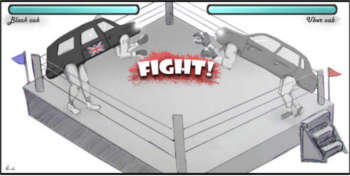The taxi app, Uber, does not break the law the High Court has found, after it ruled that smartphones are not taximeters.
Transport for London (TfL), which welcomed the 'legal clarity' on the issue, along with Uber, the Licensed Taxi Driver Association (LTDA) and the Licensed Private Hire Car Association had jointly asked for a legal declaration.
The court was asked to rule on whether smartphones, which use GPS technology and connect to external servers for the calculation of fares, comply with the law, which prohibits taximeters in private hire vehicles in London.

Uber wins this round
The LTDA has long-protested against the controversial app and said on its Twitter feed after the ruling that it has already lodged an appeal to the Supreme Court.
LTDA chairman Richard Massett said: 'We certainly are going to an appeal. It's a fact that the smartphone acts in exactly the same way as a taximeter. It calculates the fare by means of time taken and distance covered - and it's doing exactly the same job.
'Private hire legislation specifically precludes private hire from using a meter - and that's exactly what it is.'
An Uber spokesman said: 'This was not a marginal call; it is quite emphatic. In fact, it is contemptuous of the case brought before it.'
In his written judgment Mr Justice Ouseley declared: 'A taximeter, for the purposes of Section 11 of the Private Hire Vehicles (London) Act 1998, is not a device which receives GPS signals in the course of a journey, and forwards GPS data to a server located outside of the vehicle, which calculates a fare that is partially or wholly determined by reference to distance travelled and time taken, and sends the fare information back to the device.'
Mr Justice Ouseley said that a smartphone device was not “for” calculating fares, regardless of whether it was essential to enabling the calculation of fares, and added that it was drivers not their vehicles, who are 'equipped' with smartphones.
While this is good news for Uber its troubles are not over, with TfL having launched a consultation on the regulations that govern the private hire trade, which include plans for a five-minute wait between booking a taxi via an app and the pick-up and a ban on apps showing which cars are immediately available. Both measures could dent Uber's business model.
The consultation comes after the number of private hire drivers has risen from around 59,000 in 2009-2010 to over 89,000 today.
Mayor, Boris Johnson, has recently renewed his call to government to give TfL powers to cap the number of private hire vehicles in London to help address congestion and air quality concerns.
Leon Daniels, TfL’s managing director of surface transport, said: 'Disruptive technology and new business models have radically changed the way that taxi and private hire services operate and has widened customer choice. This is welcome. At the same time, as the regulator, we must ensure that regulatory requirements are met and are developed in a way that delivers the high standards customers deserve.
'As part of this, we are gauging public opinion on a range of potential changes to private hire regulations, including stricter rules on insurance and English language skills. We know that some ideas put forward for consultation are controversial, which is why we want as many people as possible to tell us what they think to help shape the future of private hire in London.'